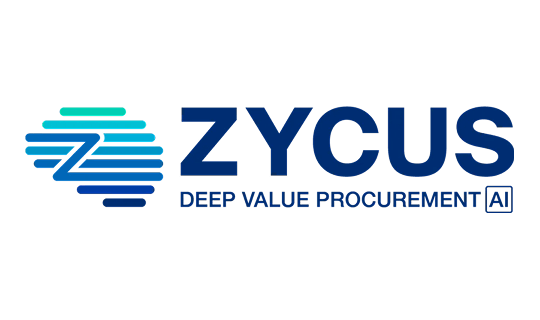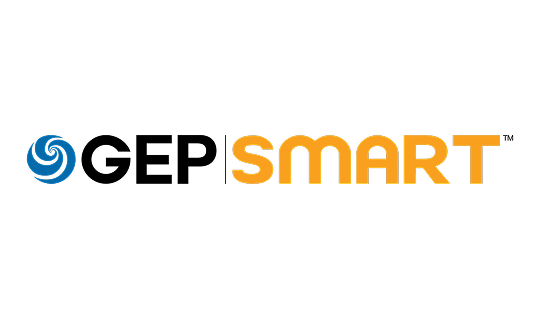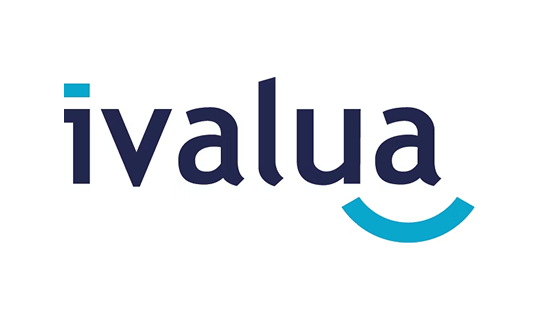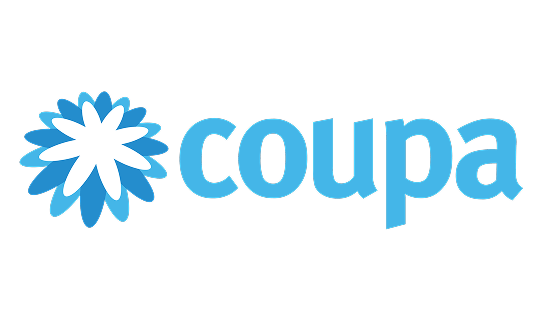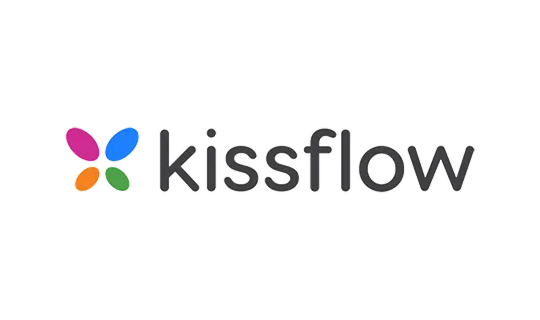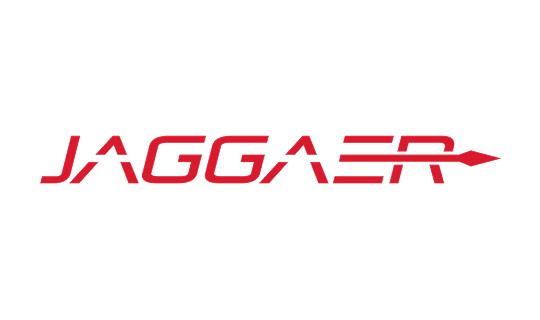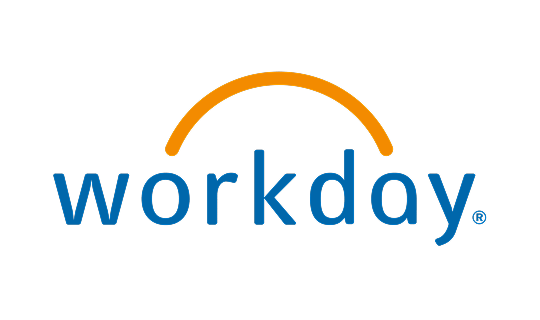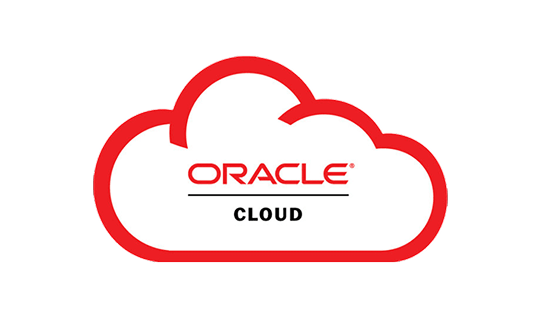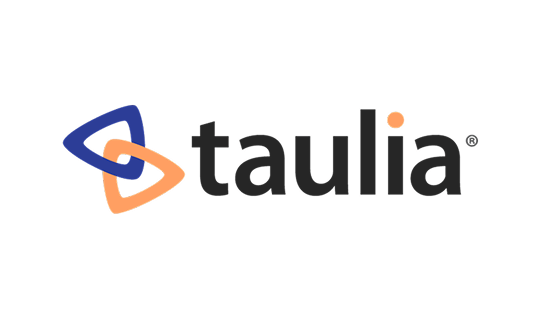Written by Marijn Overvest | Reviewed by Sjoerd Goedhart | Fact Checked by Ruud Emonds | Our editorial policy
Best Procurement Tools in 2026 — Features + Pricing
- Procurement tools are software solutions designed to manage and streamline different stages of the procurement process, such as sourcing, contracting, purchasing, and supplier management.
- These tools help organizations automate manual tasks, improve data accuracy, enforce compliance, and gain real-time visibility into spend, suppliers, and performance.
- Modern procurement tools often include AI and analytics features, enabling smarter decision-making, cost savings, and stronger supplier relationships.
The Best Procurement Tools to Use Across the Entire Workflow
Procurement has evolved significantly over the years. In the past, sourcing suppliers required extensive paperwork and manual research. Today, a single software solution can streamline nearly every step of the procurement process.
In this guide, we’ll show you which procurement tools you can use at each stage to make procurement faster and more efficient. Let’s start!

1. Needs Identification
Needs identification is typically the first step in the procurement process. At this stage, your goal is to gather data and insights to pinpoint cost-saving opportunities, define procurement strategies, and align with overall business objectives. Below are the five software solutions that can help you identify needs more efficiently:
Zycus (Merlin Intake)
Zycus’ Merlin Intake simplifies the process of capturing and organizing procurement needs across the organization. By allowing employees to send requests via platforms like web forms, MS Teams, or Slack, everything is collected early, clearly relayed, and gathered every time.
Additionally, AI provides procurement teams with a clear understanding of what is coming up, enabling them to identify trends, align with business plans, and develop their strategies in advance.
Further, Merlin Intake uses AI to automatically categorize, prioritize, and route requests. This automation helps eliminate bottlenecks and human error while surfacing insights that support more informed needs identification and cost-saving opportunities.
Pricing:
The software pricing is available upon request. For detailed cost information, you can request a quote here or contact their sales team.
Website Link: https://www.zycus.com/solution/intake-management
GEP Smart
GEP SMART supports the needs identification phase by centralizing how procurement requests are captured and managed. Through a unified, user-friendly platform, employees can submit their purchasing needs in a structured way, ensuring that procurement teams gain early visibility into organizational demand. This helps identify spending trends, anticipate requirements, and align procurement plans with broader business objectives.
The platform incorporates AI to automate the classification, validation, and routing of requests based on criteria like category, urgency, and budget thresholds. These AI-driven workflows enhance accuracy and compliance while enabling real-time insights that reveal opportunities for cost savings and smarter purchasing decisions.
Pricing:
GEP SMART is offered strictly on a quote-only basis.
Website Link: https://www.gep.com/software/gep-smart
Ivalua
Ivalua helps streamline the needs identification process by offering an AI-powered intake system that ensures procurement requests are accurately captured from the start. With guided, conversational forms and user-friendly interfaces, teams across the organization can submit their needs easily and consistently.
The platform uses AI to classify and route these inputs, giving procurement early visibility into upcoming demand. Over time, this data reveals patterns that support more informed decisions around category strategy, budgeting, and supplier planning.
Pricing:
Ivalua Buyer’s entry price is at about US$ 150,000 per year on an annual subscription basis, with the vendor supplying exact, quote-based pricing only after scoping each client’s requirements.
Website Link: https://www.capterra.com/p/103260/Ivalua-Buyer/
Coupa
Coupa improves the way organizations identify procurement needs by providing a centralized platform for capturing requests. Employees can submit their requirements in a consistent, guided format, making it easier for procurement teams to collect, organize, and analyze early demand signals.
This unified intake process helps ensure that all needs are visible from the outset, enabling better planning, budget alignment, and compliance.
Coupa’s system uses AI to guide users toward preferred products and services, reinforcing procurement policies and improving request accuracy.
Real-time analytics and integrations with collaboration tools also support early decision-making, reduce maverick spending, and uncover opportunities for cost savings.
Pricing:
The Coupa Supplier Portal itself is free for “Registered” suppliers; optional upgrades include a Verified profile at US$ 549 per year and Premium Support packages starting from US$ 499 per year.
Website Link: https://supplier.coupa.com/pricing/
Pipefy
Pipefy allows organizations to make it easier to collect purchase requests, which helps with identifying needs in procurement. With advanced forms and automated workflows in Pipefy, every request in procurement is always registered in the same way and with fewer errors.
An AI solution helps sort and prioritize requests, so procurement teams are among the first to be aware of what the company needs. With this system, getting things bought happens faster and is focused on the organization’s objectives, helping staff make smarter decisions.
Furthermore, connecting Pipefy with multiple finance and accounting systems allows smooth information transfer throughout the procurement cycle.
Pricing:
Pipefy’s Starter tier is free, while the paid plans run US$ 24 per user/month for Business, US$ 40 per user/month for Enterprise, and an Unlimited package available only via custom quote.
Website Link: https://www.capterra.com/p/144848/Pipefy/pricing/
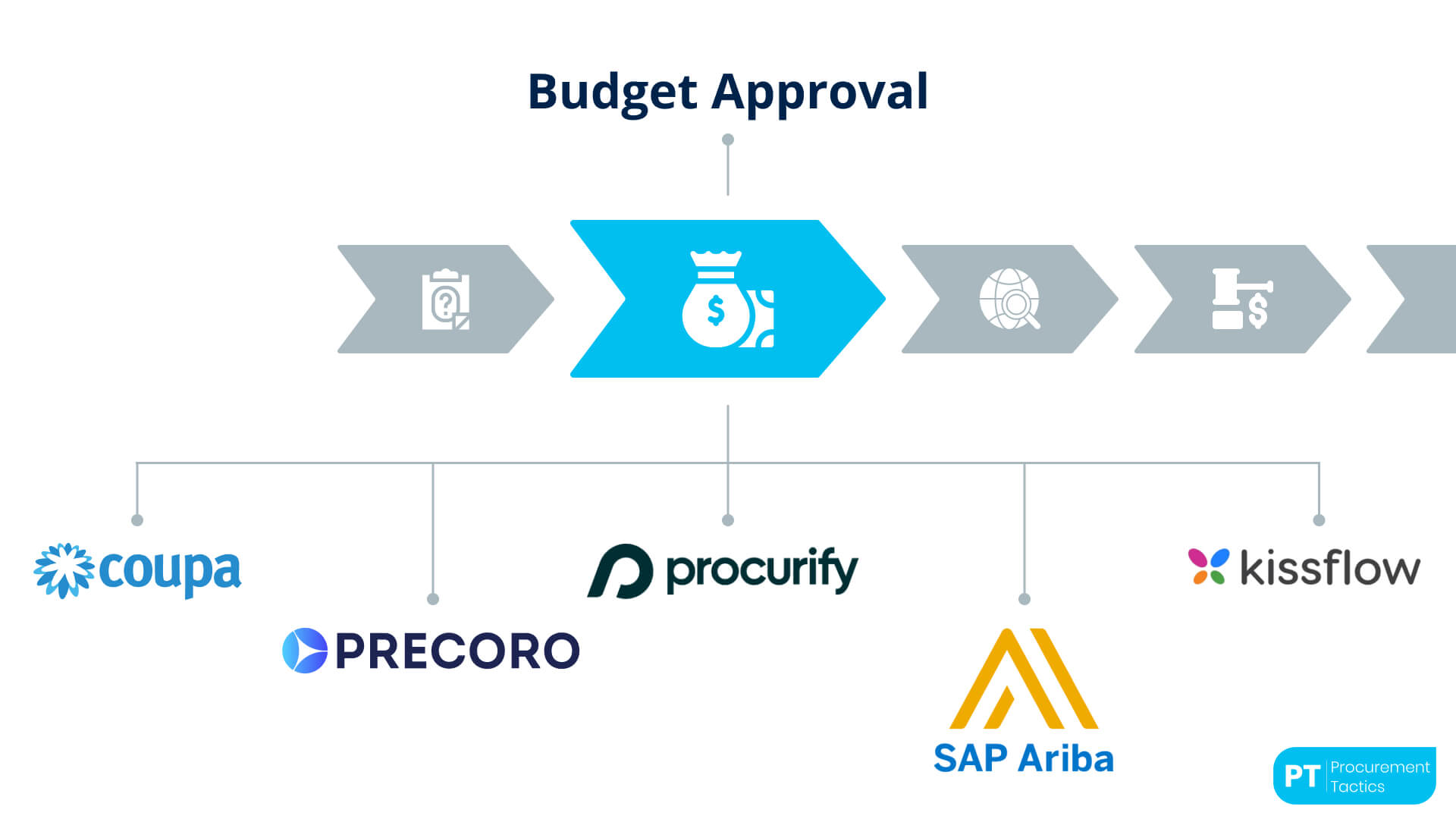
2. Budget Approval
Budget approval is the checkpoint where forecasted spend turns into an authorized allocation. You verify the estimated costs at this stage, match them against departmental and corporate limits, and secure formal sign-off from finance and executive stakeholders.
Clear approval workflows, documented justifications, and alignment with the overall budget cycle ensure that funds are reserved, compliance is maintained, and the procurement team can confidently proceed to sourcing. Below are the five software solutions that can help you identify needs more efficiently:
Coupa
Coupa embeds AI-driven “budget guardrails” into every requisition: as soon as a requester fills out a cart, the platform cross-checks live budget balances and flags lines that push a project or cost center into the red. Spend-classification algorithms then suggest the right approval chain and auto-route the request, accelerating sign-off without skipping policy steps.
Real-time dashboards give finance and executives a single view of committed versus available funds, making it easier to spot overruns early and re-forecast. Collaboration happens directly in the record, so approvers can ask clarifying questions and attach justifications without email threads. Once approved, the PO inherits the budget code, locking in control through to payment.
Behind the scenes, Coupa’s “budget guardrails” and routing suggestions are powered by artificial intelligence algorithms that classify spending and enforce policy without extra manual checks.
Pricing:
The Coupa Supplier Portal itself is free for “Registered” suppliers; optional upgrades include a Verified profile at US$ 549 per year and Premium Support packages starting from US$ 499 per year.
Website Link: https://supplier.coupa.com/pricing/
Precoro
Precoro streamlines budget approval with drag-and-drop workflow builders and instant budget checks. When a requester submits a purchase order, the system shows current and projected spend for the relevant department, letting approvers decide in one click (on desktop or mobile) whether to green-light or reject.
Because every budget is tied to a fiscal period, Precoro automatically blocks transactions that would exceed preset limits, triggers conditional escalations for large amounts, and maintains an audit trail for finance teams and auditors. While it relies on rules-based automation rather than AI, its real-time visibility helps smaller and mid-sized organizations avoid manual spreadsheet checks and last-minute surprises.
Unlike AI-driven tools, Precoro uses straightforward, rules-based automation, giving real-time visibility and control without the complexity of machine-learning models.
Pricing:
Precoro posts transparent subscription tiers: the Core plan starts at US$ $499 per month (billed annually), the Automation plan starts at US$ $999 per month (billed annually), and an Enterprise package is available only via custom quote.
Website Link: https://precoro.com/pricing
Procurify
Procurify is a cloud-based spend-management platform that puts real-time budget visibility and control at the center of every purchase. The suite pulls data from receipts, contracts, and invoices, consolidating it into a single view so approvers can see committed, pending, and remaining funds the moment a request lands.
From email, web, or mobile, stakeholders can approve or reject in seconds while “Spend Insights” surfaces upcoming burn rates and flags unusual transactions, sparking informed discussions about priorities, trade-offs, and corrective action before any money leaves the account.
All of these capabilities are driven by Procurify’s underlying AI and machine-learning engines, including a conversational interface that answers natural-language budget questions on demand.
Pricing:
Vendr’s marketplace benchmark pegs Procurify’s median contract at roughly US$ 11,489 per year, with recent deals ranging between about US$ 4,500 and US$ 35,900. A March 2025 Vendr review further notes that Procurify now markets a single flat-rate plan priced at around US$ 2,000 per month.
Website Link: https://www.vendr.com/marketplace/procurify
SAP Ariba
SAP Ariba embeds budget-check logic directly in guided-buying screens: every accounting split on a requisition is validated against a unique budget code, and requests that exceed tolerance are stopped or routed for exception approval.
For global enterprises, Ariba can reference multiple ERPs, currencies, and cost centers, ensuring the correct funds are reserved regardless of region. Machine-learning recommendations nudge users toward preferred items and contracts, helping buyers stay on policy while giving finance an auditable trail from requisition through invoice. (AI elements are present, but budget validation itself is rules-based.)
In addition to these rule-based budget checks, SAP Ariba layers in AI-driven recommendations that steer users toward preferred items and suppliers, improving compliance and speeding up purchasing decisions.
Pricing:
SAP lists Ariba Sourcing as “price upon request,” sold per-user on 12- to 60-month contracts, so you must obtain a custom quote; marketplace benchmarks from Vendr show real-world deals clustering around US $73 000 per year (with a range of roughly US $15 000 – $292 000, depending on scope and user count).
Website Link: https://www.sap.com/products/spend-management/ariba-sourcing/pricing.html
Kissflow
Kissflow provides a low-code, AI-enabled workspace where finance teams can map even the most complex budget-approval chains in minutes. Drag-and-drop nodes define roles, thresholds, and conditional branches, while AI analytics surface bottlenecks and predict which requests are likely to breach limits before they reach the approver’s queue.
Because the suite is cloud-native, approvers receive real-time notifications, can comment inline, and sign off from any device. Out-of-the-box integrations with ERP and accounting systems sync approved amounts automatically, eliminating double entry and keeping budget actuals up to date.
After those controls are in place, Kissflow layers in AI analytics that highlight workflow bottlenecks and predict which requests are likely to breach limits, helping teams act before problems arise.
Pricing:
Kissflow’s pricing begins at US$ 1,500 per month for the Basic plan (includes up to 50 users), while the Enterprise tier is sold only on a custom quote basis.
Website Link: https://thedigitalprojectmanager.com/tools/kissflow-pricing/
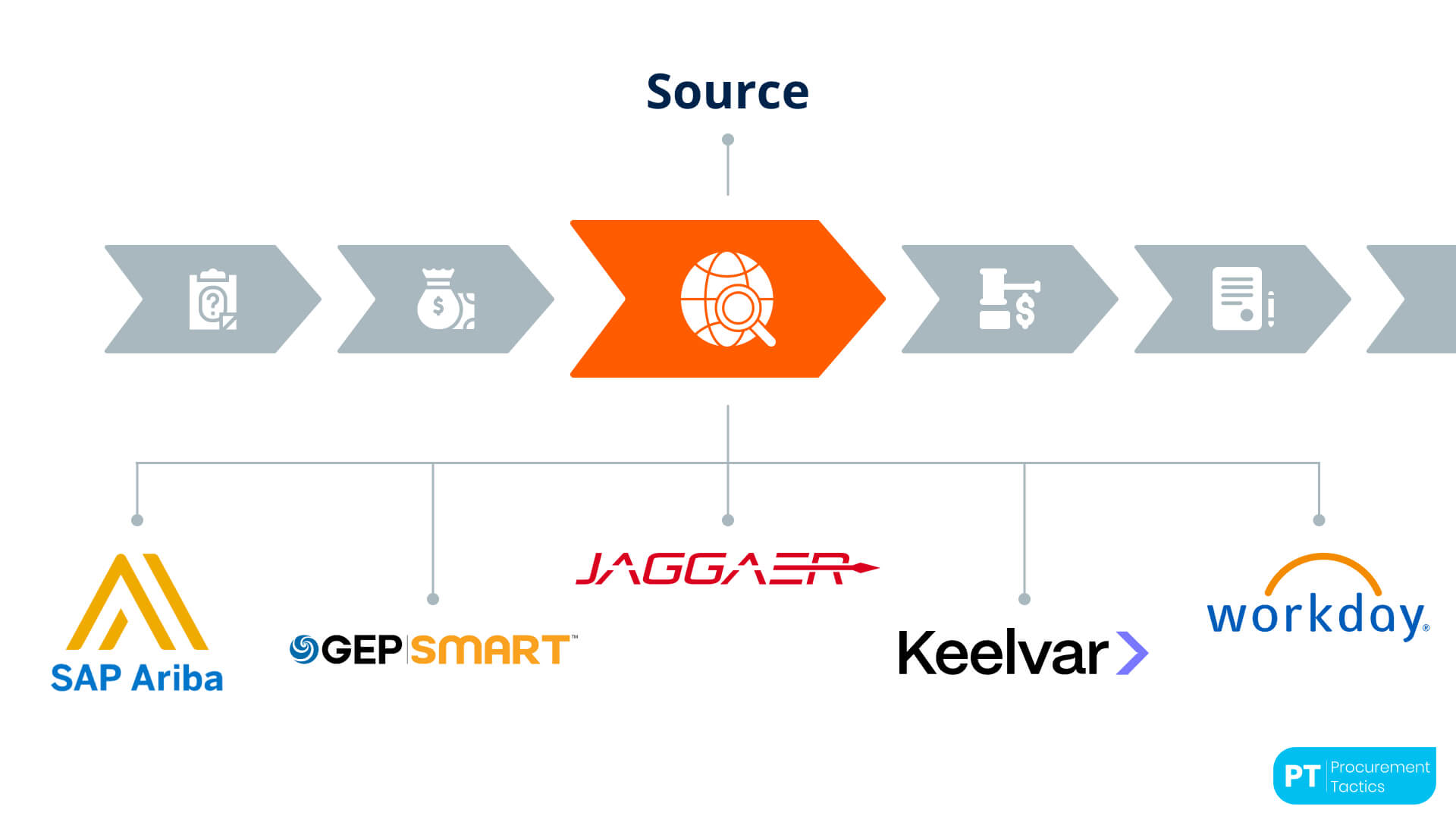
3. Source
Sourcing turns approved demand into competitive supplier options. Procurement scans the market, screens vendors on technical, financial, and ESG criteria, and pre-qualifies only compliant candidates. This due diligence workflow invites the right bidders, spurs competition, and creates contracts that balance cost, quality, and risk. Below are five tools that streamline the process:
SAP Ariba
SAP Ariba’s guided-sourcing workspace gives buyers a step-by-step wizard to launch RFx events in half the usual time while embedded budget and policy checks keep the process compliant. Templates pull in historical pricing and supplier scorecards so teams can compare bids apples-to-apples and push the winning quote straight to contract.
Behind the scenes, AI agents (Joule) analyze past events and market data to shortlist suppliers, suggest negotiation questions, and surface price-volatility alerts, letting sourcing managers focus on strategy instead of data wrangling.
After those fundamentals are in place, SAP’s Joule AI agents analyze past events and market data to auto-shortlist suppliers, suggest negotiation questions, and flag price-volatility risks, adding intelligence on top of an already robust sourcing workflow.
Pricing:
SAP lists Ariba Sourcing as “price upon request,” sold per-user on 12- to 60-month contracts, so you must obtain a custom quote; marketplace benchmarks from Vendr show real-world deals clustering around US $73 000 per year (with a range of roughly US $15 000 – $292 000, depending on scope and user count).
Website Link: https://www.sap.com/products/spend-management/ariba-sourcing/pricing.html
GEP Smart
GEP SMART unifies category planning, RFx creation, e-auctions, and contract award on one cloud platform. Real-time dashboards show savings pipelines, supplier participation rates, and cycle times so sourcing leaders can spot bottlenecks early.
It’s built-in AI parses line-item specifications, recommends the most effective event type, and classifies spend automatically, sharpening cost benchmarks across direct and indirect categories.
After those fundamentals are set, a built-in AI engine parses line-item specs, recommends the most effective event format, and auto-classifies spend, sharpening benchmarks across both direct and indirect categories.
Pricing:
GEP SMART is offered strictly on a quote-only basis.
Website Link: https://www.gep.com/software/gep-smart
Jaggaer One
JAGGAER ONE offers configurable RFQ/RFP workflows, supplier self-service portals, and multi-round bidding to drive competitive tension. Integrated risk and sustainability scores help teams pre-qualify vendors before invitations go out, reducing compliance surprises later.
An AI layer mines spend and contract data to surface demand aggregation opportunities and suggest optimal award scenarios, so buyers can model cost, risk, and ESG trade-offs in a single click.
On top of these core controls, an AI layer mines historical spend and contract data to identify demand-aggregation opportunities and recommend optimal award scenarios, letting buyers weigh cost, risk, and ESG trade-offs with a single click.
Pricing:
JAGGAER’s Advanced Rates module (and the wider JAGGAER ONE suite) is priced strictly by custom quote; public benchmarks put entry-level JAGGAER ONE deals at ≈ US$ 45,000 per year, while the UK G-Cloud price sheet lists Source-to-Contract subscriptions starting at ≈ £ 25,000 annually and scaling upward with user count and spend bands.
Website Link: https://www.jaggaer.com/solutions/advanced-rates
Keelvar
Keelvar focuses on high-volume, tactical sourcing: its bots can launch, monitor, and award spot bids for tail spend without human intervention, expanding governance to thousands of low-value events. Buyers still set the guardrails (lot structures, award rules, supplier pools) while the system executes.
Machine-learning decision engines evaluate incoming bids against price and non-price criteria, then recommend (or auto-select) the best supplier mix, freeing teams for strategic projects.
Pricing:
Keelvar sells its sourcing-optimization and autonomous-sourcing platform strictly via custom quotes, but public marketplaces peg the entry price at about US$ 18,000–25,000 per year. Capterra lists a “starting price” of $ 18,000/yr while SelectHub says it begins “from $ 25,000.”
Website Link: https://www.keelvar.com/
Workday
Workday’s collaborative sourcing hub streamlines supplier discovery, RFP creation, and scorecard-based evaluations in a consumer-grade UI that boosts stakeholder engagement. All documents, clarifications, and negotiations live in a single workspace, creating a clean audit trail from intake to award.
While its workflow logic is rules-driven rather than predictive, Workday provides real-time project trackers and analytics so sourcing teams can prioritize high-impact events and forecast savings with greater accuracy.
Pricing:
Workday HCM’s subscription at roughly US $34–42 per employee per month, translating to about US $150–300 K a year for companies under 500 employees and US $300–500 K for those with 500–2 500 staff; one-time implementation usually adds another 100–150 % of the annual software fee. Workday has dropped its historic US$ 250 K minimum, so final figures are still quote-only but typically fall within or above these ranges for larger enterprises.
Website Link: https://www.outsail.co/post/how-much-does-workday-cost
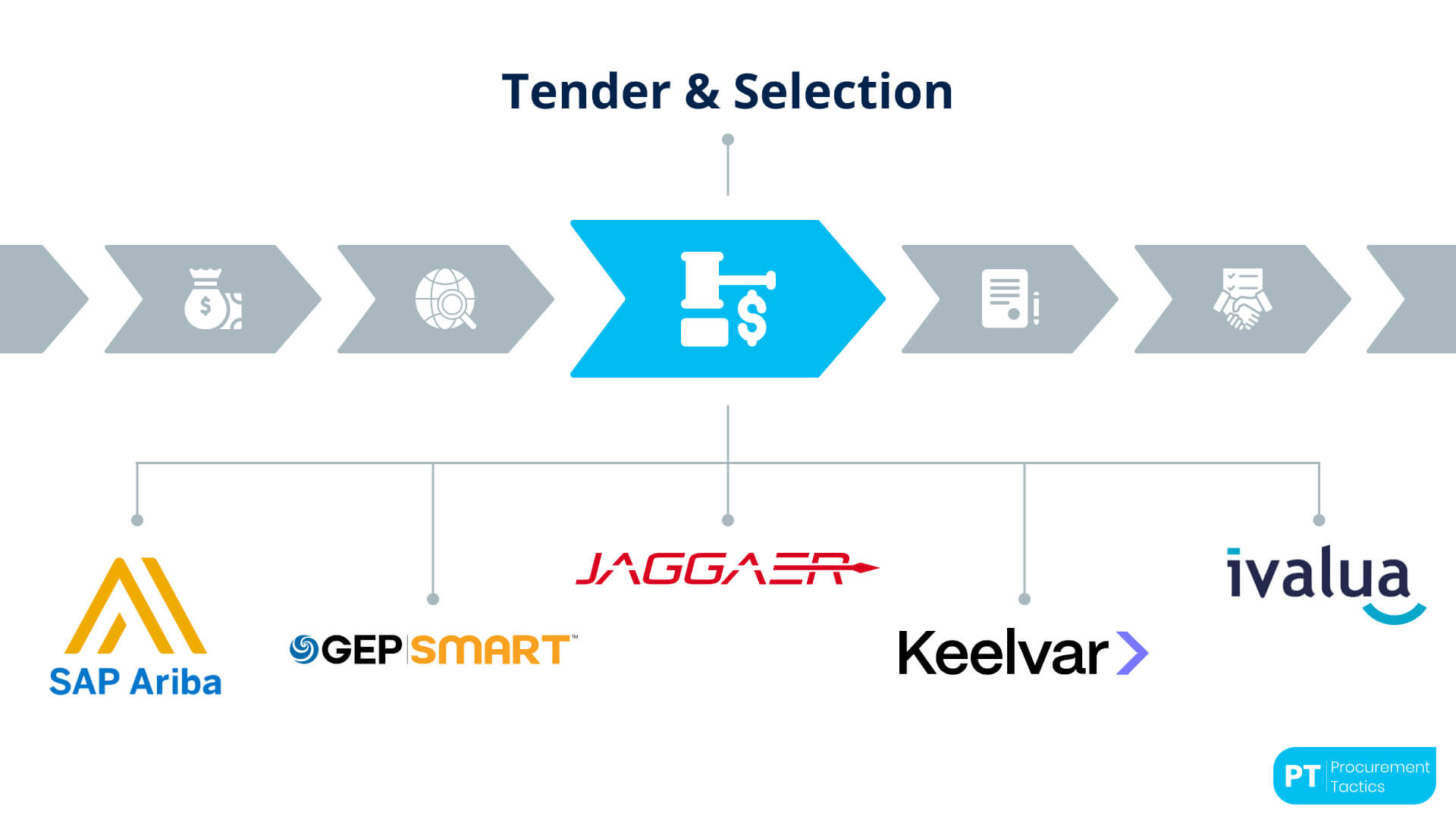
4. Tender & Selection
After pre-qualifying suppliers, procurement runs an RFI to verify capabilities, then an RFQ/RFP to capture pricing and terms. Standard templates, scoring rubrics, NDAs, and transparent timelines keep competition fair. Cross-functional teams score bids on cost, quality, service, ESG, and risk, run sourcing scenarios, and issue an audited supplier recommendation for finance and legal sign-off. Below are five software solutions that accelerate this stage:
SAP Ariba
SAP Ariba’s guided-sourcing workspace walks buyers step-by-step through RFx creation, pulls historical line items to speed setup, and embeds policy checks so only approved templates and clauses are used. Joule (SAP’s embedded AI copilot) mines past awards and current market data to auto-short-list suppliers, draft event questions, and flag price-volatility risks, letting teams launch richer events in a fraction of the usual time.
Real-time dashboards track participation, savings, and cycle times, while one-click award recommendations flow straight into contract workspaces, keeping the sourcing-to-contract hand-off seamless and fully auditable.
Pricing:
SAP lists Ariba Sourcing as “price upon request,” sold per-user on 12- to 60-month contracts, so you must obtain a custom quote; marketplace benchmarks from Vendr show real-world deals clustering around US $73 000 per year (with a range of roughly US $15 000 – $292 000, depending on scope and user count).
Website Link: https://www.sap.com/products/spend-management/ariba-sourcing/pricing.html
GEP Smart
GEP SMART unifies category plans, RFIs/RFQs, e-auctions, and award scenarios on a single cloud platform. Its AI parses specifications, recommends the ideal event type, and classifies spend on the fly, giving buyers instant benchmarks and savings forecasts while eliminating manual data entry.
Custom dashboards expose supplier participation, pipeline value, and bottlenecks, while scenario modelling lets teams balance cost, risk, and ESG factors before making an award.
Behind the scenes, an AI engine parses line-item specs, suggests the optimal event format, and auto-classifies spend, delivering instant benchmarks and savings forecasts while eliminating manual data entry.
Pricing:
GEP SMART is offered strictly on a quote-only basis.
Website Link: https://www.gep.com/software/gep-smart
JAGGAER ONE
JAGGAER ONE offers configurable RFQ/RFP flows with built-in risk and sustainability scores to ensure only compliant vendors advance. An AI analytics layer mines historical spend and contract data to surface demand-aggregation opportunities and model multi-supplier award scenarios.
Stakeholders evaluate bids in a single workspace, then run what-if simulations that weigh cost, quality, and ESG trade-offs, turning award decisions into defensible, data-driven choices.
Pricing:
JAGGAER’s Advanced Rates module (and the wider JAGGAER ONE suite) is priced strictly by custom quote; public benchmarks put entry-level JAGGAER ONE deals at ≈ US$ 45,000 per year, while the UK G-Cloud price sheet lists Source-to-Contract subscriptions starting at ≈ £ 25,000 annually and scaling upward with user count and spend bands.
Website Link: https://www.jaggaer.com/solutions/advanced-rates
Keelvar
Keelvar focuses on high-volume tactical events: its autonomous bots launch, monitor, and award spot bids for tail spend under predefined rules, bringing thousands of low-value purchases under governance. Machine-learning engines score bids against price and non-price criteria, then recommend, or automatically choose, the optimal supplier mix.
By automating the entire tender cycle for smaller buys, procurement frees up capacity for strategic sourcing while still boosting competition and capturing incremental savings.
Those autonomous bots and bid-scoring engines rely on machine-learning models that weigh both price and non-price factors before picking the winner.
Pricing:
Keelvar sells its sourcing-optimization and autonomous-sourcing platform strictly via custom quotes, but public marketplaces peg the entry price at about US$ 18,000–25,000 per year. Capterra lists a “starting price” of $ 18,000/yr while SelectHub says it begins “from $ 25,000.”
Website Link: https://www.keelvar.com/
Ivalua
Ivalua’s sourcing suite provides guided, conversational intake forms and collaborative RFx workspaces that centralize all supplier Q&A, bids, and scorecards. Its Intelligent Virtual Assistant (IVA) uses generative AI to classify requirements, suggest negotiation levers, and summarise supplier responses, giving buyers early insight into cost drivers and compliance gaps.
Scenario-analysis tools compare single- versus multi-source awards so teams can maximise value while mitigating risk, then push the final award directly into contract authoring with one click.
Pricing:
Ivalua Buyer’s entry price is at about US$ 150,000 per year on an annual subscription basis, with the vendor supplying exact, quote-based pricing only after scoping each client’s requirements.
Website Link: https://www.capterra.com/p/103260/Ivalua-Buyer/
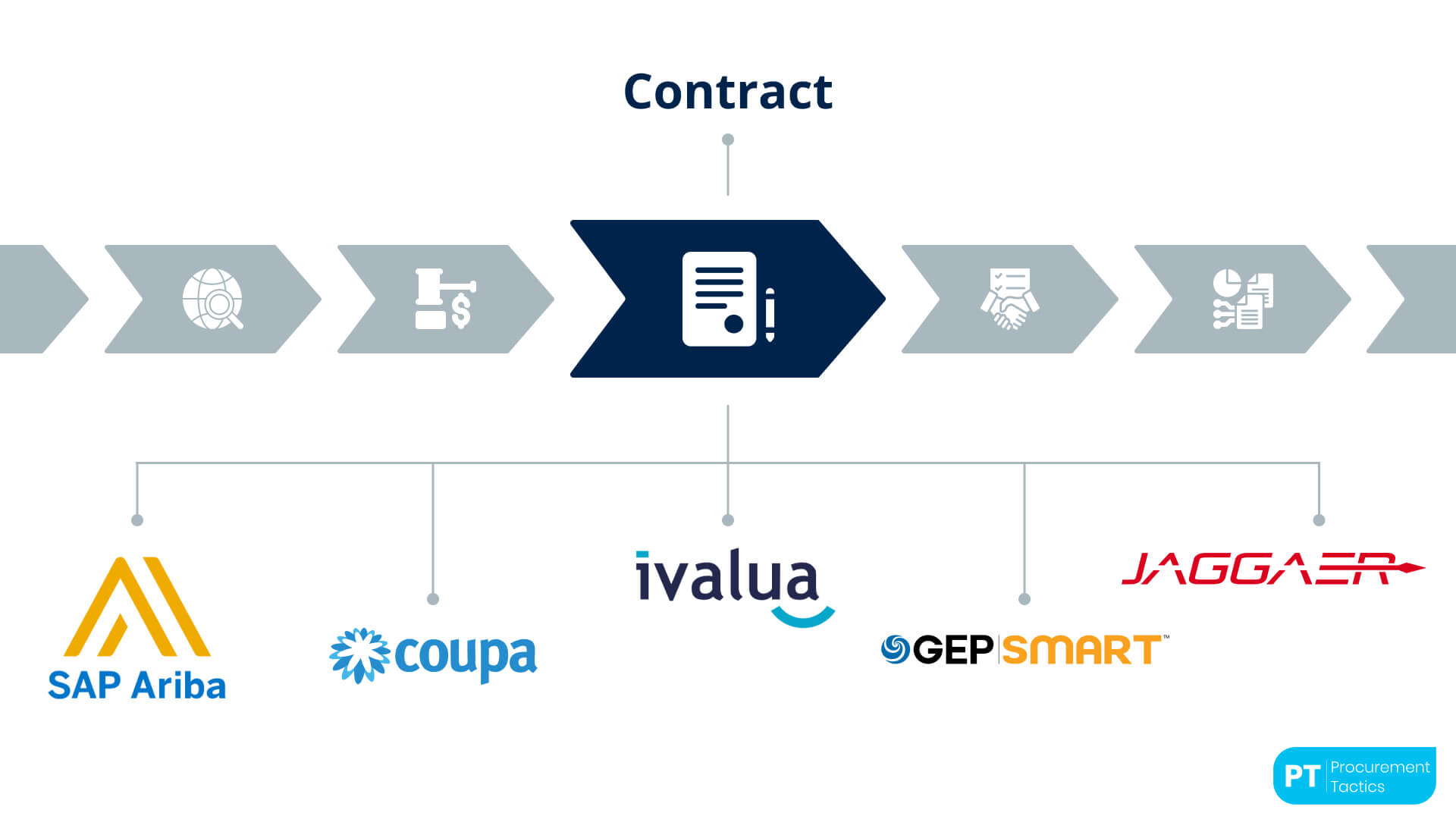
5. Contract
Procurement converts the winning bid into a binding agreement using standardized templates and clause libraries to speed drafting. Legal, finance, and stakeholders review tracked changes, then finalize via e-signature.
The executed contract is stored in a central CLM repository, which syncs with ERP/AP systems, monitors milestones and KPIs, and sends alerts for renewals or renegotiations, ensuring terms, compliance, and value are maintained throughout the supplier relationship. Below are the five software solutions that can help you identify needs more efficiently:
SAP Ariba
SAP Ariba’s contract workspace converts an awarded bid into a compliant agreement in minutes. Clause libraries and configurable templates keep language consistent, while version-controlled red-lining lets legal, finance, and suppliers collaborate without losing audit history. Joule, SAP’s embedded AI copilot, scans negotiation threads, flags non-standard terms, and proposes fallback clauses so reviewers focus only on true exceptions.
Dashboards track cycle times, milestone compliance, and renewal dates, and the executed contract flows automatically to ERP and AP systems so spend, obligations, and invoices stay in sync, delivering full auditability from award to expiry.
Pricing:
SAP lists Ariba Sourcing as “price upon request,” sold per-user on 12- to 60-month contracts, so you must obtain a custom quote; marketplace benchmarks from Vendr show real-world deals clustering around US $73 000 per year (with a range of roughly US $15 000 – $292 000, depending on scope and user count).
Website Link: https://www.sap.com/products/spend-management/ariba-sourcing/pricing.html
Coupa
Coupa centralizes every contract type (buy-side, sell-side, NDA) on a single cloud platform. Advanced AI parsers automatically extract key metadata (value, term, SLA) and benchmark clause language against internal standards, surfacing risk hotspots before signing.
Real-time alerts warn owners when spend drifts off-contract or a renewal window nears, while generative AI produces concise contract summaries for approvers, shrinking review cycles and improving compliance across the portfolio.
Pricing:
The Coupa Supplier Portal itself is free for “Registered” suppliers; optional upgrades include a Verified profile at US$ 549 per year and Premium Support packages starting from US$ 499 per year.
Website Link: https://supplier.coupa.com/pricing/
Ivalua
Ivalua’s collaborative workspace stores every draft, comment, and e-signature in one thread, keeping audit trails effortless. It’s an Intelligent Virtual Assistant (IVA), built on generative AI, that classifies clauses, auto-fills headers, and drafts negotiation summaries, cutting review time dramatically.
Post-execution, the same engine scans invoices and supplier data for deviations, alerting owners before value erodes and ensuring continuous compliance with negotiated terms.
Pricing:
Ivalua Buyer’s entry price is at about US$ 150,000 per year on an annual subscription basis, with the vendor supplying exact, quote-based pricing only after scoping each client’s requirements.
Website Link: https://www.capterra.com/p/103260/Ivalua-Buyer/
GEP Smart
GEP SMART automates the full contract life cycle, from template creation and collaborative editing to e-signature and obligation tracking, inside a unified spend-management suite. Embedded AI recommends optimal clauses based on commodity, region, and risk profile, extracts milestones for automated reminders, and mines executed contracts to benchmark future negotiations.
Enterprise-wide search makes every agreement discoverable in seconds, while dashboards surface savings leakages and upcoming renewals so teams can act before value slips away.
Pricing:
GEP SMART is offered strictly on a quote-only basis.
Website Link: https://www.gep.com/software/gep-smart
JAGGAER
JAGGAER centralizes drafting, approval, and renewal in a secure repository that syncs with sourcing and P2P modules. Contracts AI uses NLP and machine learning to auto-tag clauses, extract metadata, and detect deviations from standard language, slashing manual review time.
Machine-learning models continuously monitor performance data and third-party-risk feeds, pushing alerts when obligations slip or vendor risk scores change, so contract value and compliance stay protected throughout the term.
Pricing:
JAGGAER’s Advanced Rates module (and the wider JAGGAER ONE suite) is priced strictly by custom quote; public benchmarks put entry-level JAGGAER ONE deals at ≈ US$ 45,000 per year, while the UK G-Cloud price sheet lists Source-to-Contract subscriptions starting at ≈ £ 25,000 annually and scaling upward with user count and spend bands.
Website Link: https://www.jaggaer.com/solutions/advanced-rates

6. Onboard
After contract signature, procurement onboards the supplier through a portal where the vendor uploads master data, bank details, certificates, and ESG disclosures.
Automated checks verify tax IDs, sanctions lists, and sustainability scores; once cleared, a supplier ID syncs to ERP, SRM, and risk systems.
Ongoing alerts chase expiring documents so the supplier stays compliant for orders, invoices, and performance reviews. Below are five tools that streamline this step:
SAP Ariba
SAP Ariba’s contract workspace converts an awarded bid into a policy-compliant agreement in minutes. Clause libraries and configurable templates keep language consistent, while version-controlled red-lining lets legal, finance, and suppliers collaborate without losing audit history. Joule, SAP’s embedded AI copilot, scans negotiation threads, flags non-standard terms, and proposes fallback clauses so reviewers focus only on true exceptions.
Real-time dashboards track cycle times, milestone compliance, and renewal dates; the executed contract flows automatically to ERP and AP systems so spend, obligations, and invoices stay in sync—delivering full auditability from award to expiry.
Pricing:
SAP lists Ariba Sourcing as “price upon request,” sold per-user on 12- to 60-month contracts, so you must obtain a custom quote; marketplace benchmarks from Vendr show real-world deals clustering around US $73 000 per year (with a range of roughly US $15 000 – $292 000, depending on scope and user count).
Website Link: https://www.sap.com/products/spend-management/ariba-sourcing/pricing.html
Coupa
Coupa centralizes every contract type—buy-side, sell-side, NDA—on one cloud platform. Advanced AI parsers automatically extract key metadata (value, term, SLA) and benchmark clause language against internal standards, surfacing risk hotspots before signing.
Real-time alerts warn owners when spend drifts off-contract or a renewal window nears, while generative AI produces concise contract summaries for approvers, shrinking review cycles and improving compliance across the portfolio.
Pricing:
The Coupa Supplier Portal itself is free for “Registered” suppliers; optional upgrades include a Verified profile at US$ 549 per year and Premium Support packages starting from US$ 499 per year.
Website Link: https://supplier.coupa.com/pricing/
Ivalua
Ivalua’s collaborative workspace stores every draft, comment, and e-signature in one thread, keeping audit trails effortless. It’s an Intelligent Virtual Assistant (IVA), powered by generative AI, that classifies clauses, auto-fills headers, and drafts negotiation summaries, cutting review time dramatically.
Post-execution, the same engine scans invoices and supplier data for deviations, alerting owners before value erodes and ensuring continuous compliance with negotiated terms.
Pricing:
Ivalua Buyer’s entry price is at about US$ 150,000 per year on an annual subscription basis, with the vendor supplying exact, quote-based pricing only after scoping each client’s requirements.
Website Link: https://www.capterra.com/p/103260/Ivalua-Buyer/
GEP Smart
GEP SMART automates the full contract life cycle, from template creation and collaborative editing to e-signature and obligation tracking, inside a unified spend-management suite.
Embedded AI recommends optimal clauses based on commodity, region, and risk profile, extracts milestones for automated reminders, and mines executed contracts to benchmark future negotiations.
Enterprise-wide search makes every agreement discoverable in seconds, while dashboards surface savings leakages and upcoming renewals so teams can act before value slips away.
Pricing:
GEP SMART is offered strictly on a quote-only basis.
Website Link: https://www.gep.com/software/gep-smart
JAGGAER
JAGGAER centralizes drafting, approval, and renewal in a secure repository that syncs with sourcing and P2P modules. Contracts AI uses NLP and machine learning to auto-tag clauses, extract metadata, and detect deviations from standard language, slashing manual review time.
Machine-learning models continuously monitor performance data and third-party risk feeds, pushing alerts when obligations slip or vendor risk scores change, so contract value and compliance stay protected throughout the term.
Pricing:
JAGGAER’s Advanced Rates module (and the wider JAGGAER ONE suite) is priced strictly by custom quote; public benchmarks put entry-level JAGGAER ONE deals at ≈ US$ 45,000 per year, while the UK G-Cloud price sheet lists Source-to-Contract subscriptions starting at ≈ £ 25,000 annually and scaling upward with user count and spend bands.
Website Link: https://www.jaggaer.com/solutions/advanced-rates
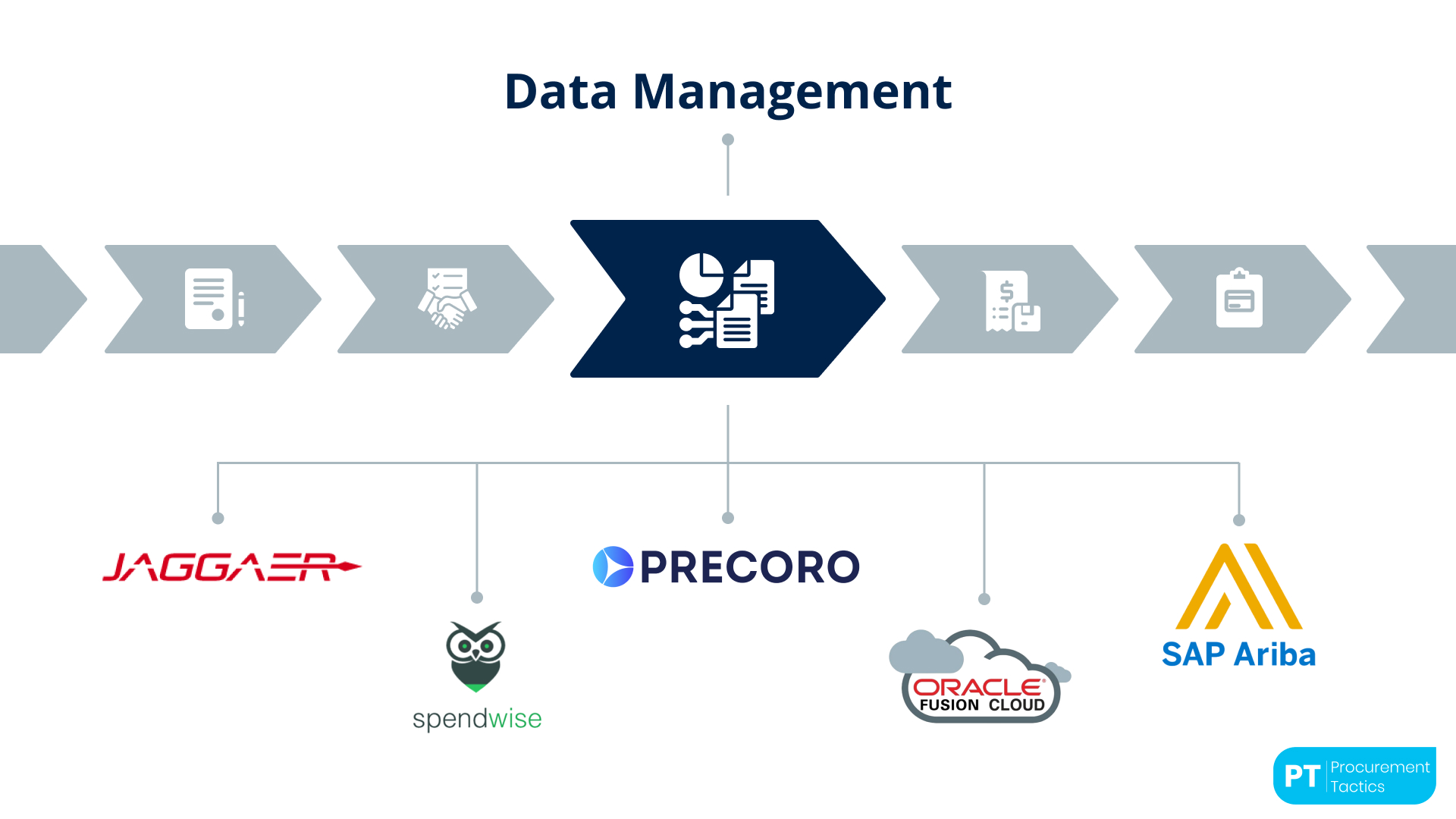
7. Data Management
This stage in the procurement process helps guarantee that the procurement operations are correct. In data management, the procurement team’s main goal is to safeguard the accuracy and completeness of records such as supplier records, contract information, prices charged, and past orders.
When data is reliable, procurement managers can make good decisions, stay compliant, and use resources more wisely. Below are the five software solutions that can help you identify needs more efficiently:
JAGGAER
JAGGAER ONE’s Data Insights solution helps procurement teams centralize, cleanse, and analyze procurement data from across the organization. Consolidating information into one unified platform gives teams a clear view of spend, supplier performance, and compliance, enabling better decision-making and strategic planning.
Procurement professionals can explore intuitive dashboards and reports that break down data by category, region, and supplier. This visibility supports the identification of savings opportunities, policy gaps, and performance issues early on.
AI is built into data insights to automate data normalization and enrichment, detect spending patterns, and surface hidden risks, making procurement analysis faster, more accurate, and forward-looking.
Pricing:
JAGGAER’s Advanced Rates module (and the wider JAGGAER ONE suite) is priced strictly by custom quote; public benchmarks put entry-level JAGGAER ONE deals at ≈ US$ 45,000 per year, while the UK G-Cloud price sheet lists Source-to-Contract subscriptions starting at ≈ £ 25,000 annually and scaling upward with user count and spend bands.
Website Link: https://www.jaggaer.com/solutions/advanced-rates
Spendwise
Spendwise is a cloud-based procurement solution designed to streamline purchasing, expense tracking, and budget management for small to mid-sized businesses.
It centralizes procurement data, allowing teams to create and approve purchase orders, manage vendor information, and monitor expenses in real time, all within a user-friendly interface.
Users can set up their own approval steps, use comprehensive reporting features, and integrate their data with QuickBooks Online for better financial control.
Spendwise offers invoice matching, budget tracking, and supplier evaluation to ensure organizations stay on top of their procurement and choose to spend wisely.
Pricing:
Spendwise’s pricing is straightforward: the Basic plan costs US$ 9 per user per month (up to 5 users, 10 transactions), the Pro plan is US$ 19 per user per month with unlimited transactions, and an Enterprise tier is available only via custom quote.
Website Link: https://www.spendwise.com/pricing
Precoro
Precoro streamlines procurement by centralizing data from purchasing, approvals, budgeting, and supplier management into one easy-to-navigate platform. This unified system helps teams eliminate manual spreadsheets and gain real-time visibility into procurement activity across departments and locations.
Procurement professionals can track purchase orders, monitor budget consumption, and manage vendor records—all within customizable approval flows and detailed audit trails. The platform’s reporting tools make it easy to analyze historical spend, identify patterns, and ensure policy compliance.
Pricing:
Precoro posts transparent subscription tiers: the Core plan starts at US$ $499 per month (billed annually), the Automation plan starts at US$ $999 per month (billed annually), and an Enterprise package is available only via custom quote.
Website Link: https://precoro.com/pricing
Oracle Fusion Cloud Procurement
Through Oracle Fusion Cloud Procurement, procurement teams get a unified source-to-settle view of spend, how suppliers perform, and compliance information. This information provides organizations with the knowledge they require to make the right decisions, manage activities most effectively, and control risks.
Through advanced analytics and dashboards, users are able to view information about category, organization, and geography. Having progress and results visible encourages authorities to spot areas where expense reduction, improvement in tracking, and better policy creation are required.
AI is implemented in Oracle Fusion Cloud Procurement to boost the performance of procurement activities. The help of AI allows spending to be automated, and provides insights for forecasting future expenses and real-time monitoring of risks, so that procurement teams can handle supplier relationships smartly and improve sourcing strategies.
Pricing:
Oracle Procurement Cloud at US$ 650 per user per month for the Sourcing module and US$ 405 per user per month for Procurement Contracts, with enterprise bundles still provided only via custom quote.
Website Link: https://www.g2.com/products/oracle-procurement-cloud/pricing
SAP Ariba
To organize all the data, SAP Ariba connects customer master data from SAP ERP or SAP S/4HANA. As a result of integration, procurement relies on precise and steady data to generate requisitions, purchase orders, and invoices smoothly.
There are also advanced spend analysis tools available to give a full view of all procurement activities in the company. Those using the accounting software can use detailed reporting and analytics to watch spending, check supplier performance, and track compliance data.
Pricing:
SAP lists Ariba Sourcing as “price upon request,” sold per-user on 12- to 60-month contracts, so you must obtain a custom quote; marketplace benchmarks from Vendr show real-world deals clustering around US $73 000 per year (with a range of roughly US $15 000 – $292 000, depending on scope and user count).
Website Link: https://www.sap.com/products/spend-management/ariba-sourcing/pricing.html

8. Order, Receipt & Match
Order, receive, and match turns an approved requirement into a clean, audited payment. Employees submit a request, which, when approved, becomes a purchase order. When the goods or services arrive, the recipient records the receipt.
Then, the payment department compares the invoice to the purchase order and receipt, flags any discrepancies, and posts charges for items not yet invoiced.
This closed-loop flow controls costs, speeds up payment to suppliers, and ensures that the general ledger is accurate. The five software tools presented below can simplify this process:
SAP Ariba
SAP Ariba centralizes supplier master data, contracts, price lists, and invoices in one cloud workspace that syncs natively with SAP ERP.
Teams can create purchase orders, track budgets, and enforce compliance through configurable approval flows and audit trails. Built-in analytics highlight spend by category, supplier risk scores, and upcoming document expirations so nothing slips through the cracks.
Joule, SAP’s embedded AI copilot, enriches records and flags anomalous spend in the background.
Pricing:
SAP lists Ariba Sourcing as “price upon request,” sold per-user on 12- to 60-month contracts, so you must obtain a custom quote; marketplace benchmarks from Vendr show real-world deals clustering around US $73 000 per year (with a range of roughly US $15 000 – $292 000, depending on scope and user count).
Website Link: https://www.sap.com/products/spend-management/ariba-sourcing/pricing.html
Coupa
Coupa unifies requisitions, contracts, and supplier profiles to give every stakeholder a single, real-time view of spend.
Users can set granular approval thresholds, automate three-way matching, and collaborate with vendors through a self-service portal. Dynamic dashboards surface savings opportunities, policy breaches, and cash-flow forecasts in just a few clicks.
Coupa AI continuously normalizes data and predicts outliers to keep information clean and actionable.
Pricing:
The Coupa Supplier Portal itself is free for “Registered” suppliers; optional upgrades include a Verified profile at US$ 549 per year and Premium Support packages starting from US$ 499 per year.
Website Link: https://supplier.coupa.com/pricing/
GEP Smart
GEP SMART brings sourcing, contract, and supplier data together so buyers can manage the full lifecycle without spreadsheets or disjointed apps.
Role-based workflows validate new vendor records, track contract versions, and trigger renewal alerts, while interactive reports reveal spend patterns and compliance gaps.
Its AI layer recommends data-cleansing actions and pinpoints duplicate or risky supplier entries.
Pricing:
GEP SMART is offered strictly on a quote-only basis.
Website Link: https://www.gep.com/software/gep-smart
Ivalua
Ivalua offers a configurable master data hub where global teams store supplier credentials, price books, and ESG documents in one place.
Automated validation rules stop duplicates, and expiration reminders ensure certificates stay current. Embedded spend cubes let users slice data by region, category, or risk rating for fast insights.
Machine-learning models predict incomplete or high-risk records and prioritize them for correction.
Pricing:
Ivalua Buyer’s entry price is at about US$ 150,000 per year on an annual subscription basis, with the vendor supplying exact, quote-based pricing only after scoping each client’s requirements.
Website Link: https://www.capterra.com/p/103260/Ivalua-Buyer/
Oracle Fusion Cloud Procurement
Oracle Procurement Cloud embeds supplier and contract data directly into the broader Fusion ERP, giving finance and procurement a shared “source of truth.
The platform handles vendor onboarding, price-book maintenance, and PO-to-invoice matching with tight role-based controls and audit logs. Real-time analytics track data accuracy, contract coverage, and budget variance across entities.
Oracle’s AI services automatically reconcile data discrepancies and surface anomaly alerts.
Pricing:
Oracle Procurement Cloud at US$ 650 per user per month for the Sourcing module and US$ 405 per user per month for Procurement Contracts, with enterprise bundles still provided only via custom quote.
Website Link: https://www.g2.com/products/oracle-procurement-cloud/pricing
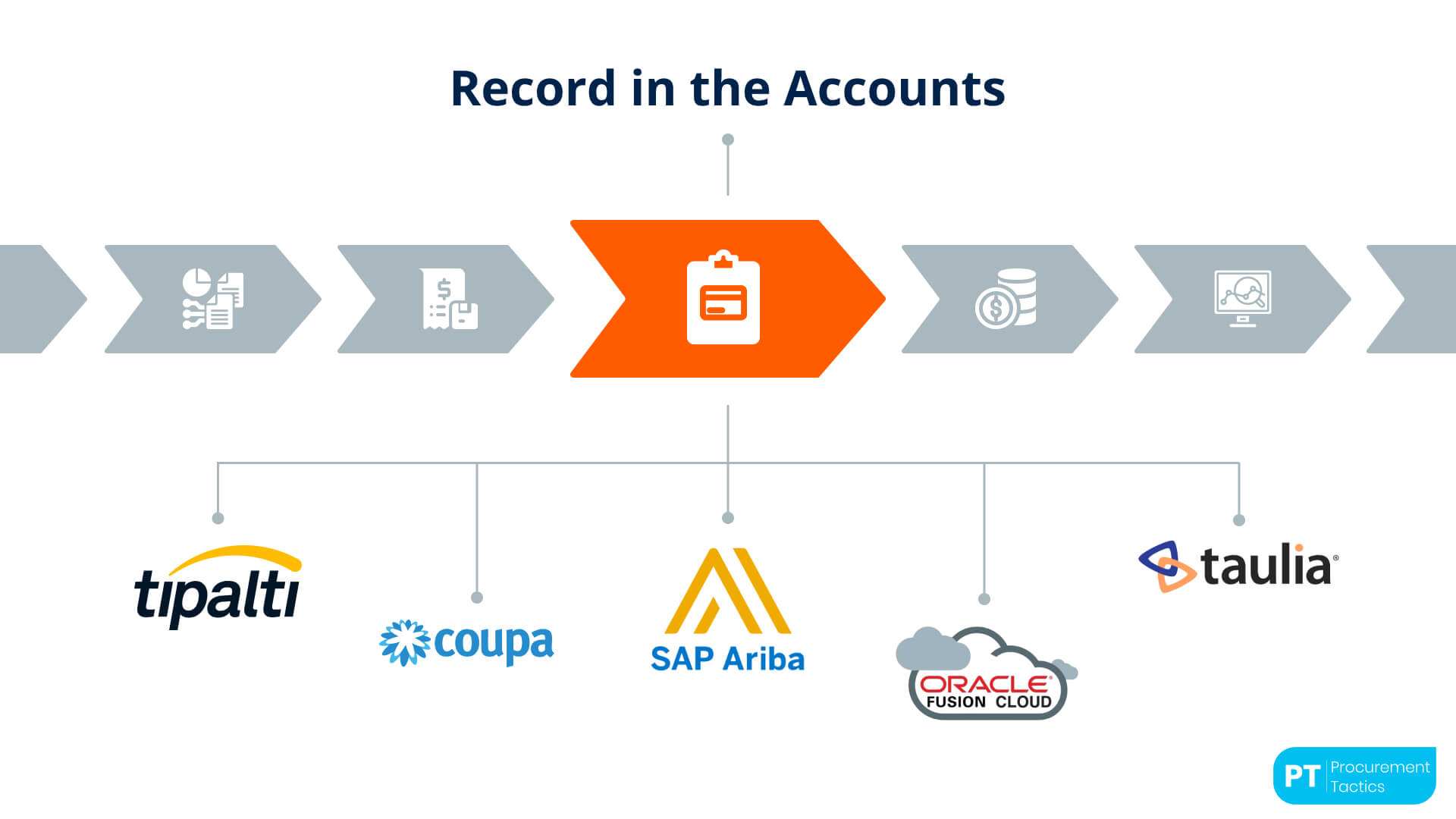
9. Record in the Accounts
This stage involves recording and reporting all financial transactions related to procurement activities. It ensures that every purchase, payment, and contract obligation is accurately documented and properly accounted for. Maintaining clear and consistent financial records supports budget tracking, audit readiness, and financial transparency.
It also helps procurement teams align with accounting departments and comply with internal and regulatory requirements. Below are five tools that can help streamline procurement-related financial recording and reporting:
Tipalti
Tipalti centralizes payables by capturing invoices, routing approvals, and issuing global payments, all while syncing transactions to ERP and GL accounts for instant reconciliation. Finance teams gain real-time visibility into liabilities, tax forms (W-8/W-9), and early-payment discounts, keeping books audit-ready with minimal manual keying.
Tipalti’s AI engine flags duplicate invoices and validates supplier data before payment.
Pricing:
Tipalti charges a platform fee that starts at US$ 99 per month for the Starter tier, while third-party listings show the more robust Tipalti Express plan at roughly US$ 149 per month; larger transaction volumes and advanced add-ons are priced only through custom quotes.
Website Link: https://tipalti.com/en-eu/pricing/
Coupa
Coupa unifies requisitions, POs, invoices, and expense claims so every procurement transaction flows straight into the ledger without re-entry. Three-way matching, configurable approval chains, and prepaid-asset amortization ensure each payment is booked to the right account and budget. Interactive dashboards track accruals, cash outflow, and compliance in one place.
Coupa AI normalizes invoice data and predicts anomalies to prevent posting errors.
Pricing:
The Coupa Supplier Portal itself is free for “Registered” suppliers; optional upgrades include a Verified profile at US$ 549 per year and Premium Support packages starting from US$ 499 per year.
Website Link: https://supplier.coupa.com/pricing/
SAP Ariba
SAP Ariba feeds approved purchase orders, service-entry sheets, and invoices directly into SAP S/4HANA Finance, preserving full audit trails from sourcing through settlement. Built-in tax, FX, and duplicate checks keep journal entries clean, while role-based workflows document every approval for Sarbanes–Oxley readiness.
Joule, SAP’s embedded AI copilot, enriches accounting records and surfaces unusual spend patterns.
Pricing:
SAP lists Ariba Sourcing as “price upon request,” sold per-user on 12- to 60-month contracts, so you must obtain a custom quote; marketplace benchmarks from Vendr show real-world deals clustering around US $73 000 per year (with a range of roughly US $15 000 – $292 000, depending on scope and user count).
Website Link: https://www.sap.com/products/spend-management/ariba-sourcing/pricing.html
Oracle Fusion Cloud Procurement
Oracle Procurement Cloud ties supplier onboarding, contract PO releases, and e-invoicing to a shared Fusion GL, eliminating interface breaks between procurement and accounting. Automated accruals, multi-currency handling, and IFRS/GAAP compliance reports keep period closes fast and accurate.
Oracle’s adaptive intelligence services auto-reconcile invoice exceptions and flag outliers.
Pricing:
Oracle Procurement Cloud at US$ 650 per user per month for the Sourcing module and US$ 405 per user per month for Procurement Contracts, with enterprise bundles still provided only via custom quote.
Website Link: https://www.g2.com/products/oracle-procurement-cloud/pricing
Taulia
Taulia bridges procurement and treasury by flipping approved POs into e-invoices and offering suppliers dynamic-discount payment options that post straight to the company’s ERP. Finance gains live views of payable aging, working-capital impact, and early-payment yield, all with full transaction-level traceability.
Taulia’s AI analyzes supplier behavior to optimize discount offers and predict cash-flow needs.
Pricing:
Starting price of roughly US$ 2,210 per year for Taulia, yet Taulia’s own support site clarifies that supplier access is free and full enterprise licensing is available only through a custom quote.
Website Link: https://www.capterra.com/p/24026/Taulia/

10. Payment
The payment stage closes the procure-to-pay loop by issuing funds for goods or services that have been received and verified.
Here, procurement and finance match invoices to POs and receipts, run compliance checks, and release payments through the organization’s approved channels, ensuring suppliers are paid accurately, on time, and in full audit compliance.
Timely, well-documented payments sustain supplier relationships and keep cash-flow projections reliable. Below are five software solutions that help you streamline this step:
Tipalti
Tipalti streamlines payments end-to-end by capturing invoices, validating supplier tax data, and issuing mass payouts in 196 countries, all while handling FX, tax forms, and regulatory checks automatically. Integrated approval chains and real-time reconciliation feed every transaction straight into the ERP or GL, so finance closes the books faster and with full audit trails.
Tipalti’s AI flags duplicate invoices and high-risk suppliers before any funds are released.
Pricing:
Tipalti charges a platform fee that starts at US$ 99 per month for the Starter tier, while third-party listings show the more robust Tipalti Express plan at roughly US$ 149 per month; larger transaction volumes and advanced add-ons are priced only through custom quotes.
Website Link: https://tipalti.com/en-eu/pricing/
Taulia
Taulia flips approved POs into e-invoices and offers suppliers dynamic-discount or supply-chain-finance options that settle directly through the company’s treasury rails. A real-time dashboard shows working-capital impact, payable aging, and discount yield, giving finance tight cash-flow control without manual spreadsheets.
Taulia applies machine learning to predict supplier discount uptake and optimize cash allocation.
Pricing:
Starting price of roughly US$ 2,210 per year for Taulia, yet Taulia’s own support site clarifies that supplier access is free and full enterprise licensing is available only through a custom quote.
Website Link: https://www.capterra.com/p/24026/Taulia/
Coupa
Coupa Pay unifies virtual cards, ACH/wire, and global cross-border payments inside the same BSM interface that houses requisitions, POs, and invoices, eliminating hand-offs between procurement and AP. Three-way matching, touchless invoice capture, and real-time budget checks ensure every payment lands in the right account and cost center.
Coupa AI continuously normalizes invoice data and spots anomalies to prevent payment errors.
Pricing:
The Coupa Supplier Portal itself is free for “Registered” suppliers; optional upgrades include a Verified profile at US$ 549 per year and Premium Support packages starting from US$ 499 per year.
Website Link: https://supplier.coupa.com/pricing/
SAP Ariba Payables
SAP Ariba routes approved invoices through ERP-native payment runs, applying automated tax, duplicate, and fraud checks before releasing funds via ACH, card, or Ariba Pay. End-to-end audit logs tie each payment back to its contract and PO, supporting SOX compliance and supplier transparency through the Ariba Network portal.
Joule, SAP’s embedded AI copilot, enriches payment data and highlights unusual spend patterns.
Pricing:
SAP lists Ariba Sourcing as “price upon request,” sold per-user on 12- to 60-month contracts, so you must obtain a custom quote; marketplace benchmarks from Vendr show real-world deals clustering around US $73 000 per year (with a range of roughly US $15 000 – $292 000, depending on scope and user count).
Website Link: https://www.sap.com/products/spend-management/ariba-sourcing/pricing.html
Oracle Fusion Cloud Procurement
Oracle Procurement Cloud feeds matched invoices into Fusion Payables, where multi-currency settlement, discount capture, and automated accruals post directly to the GL. Role-based controls, segregation-of-duties checks, and IFRS/GAAP reporting keep every disbursement compliant and audit-ready, even across complex global entities.
Oracle Adaptive Intelligence auto-reconciles payment exceptions and flags high-risk transactions.
Pricing:
Oracle Procurement Cloud at US$ 650 per user per month for the Sourcing module and US$ 405 per user per month for Procurement Contracts, with enterprise bundles still provided only via custom quote.
Website Link: https://www.g2.com/products/oracle-procurement-cloud/pricing
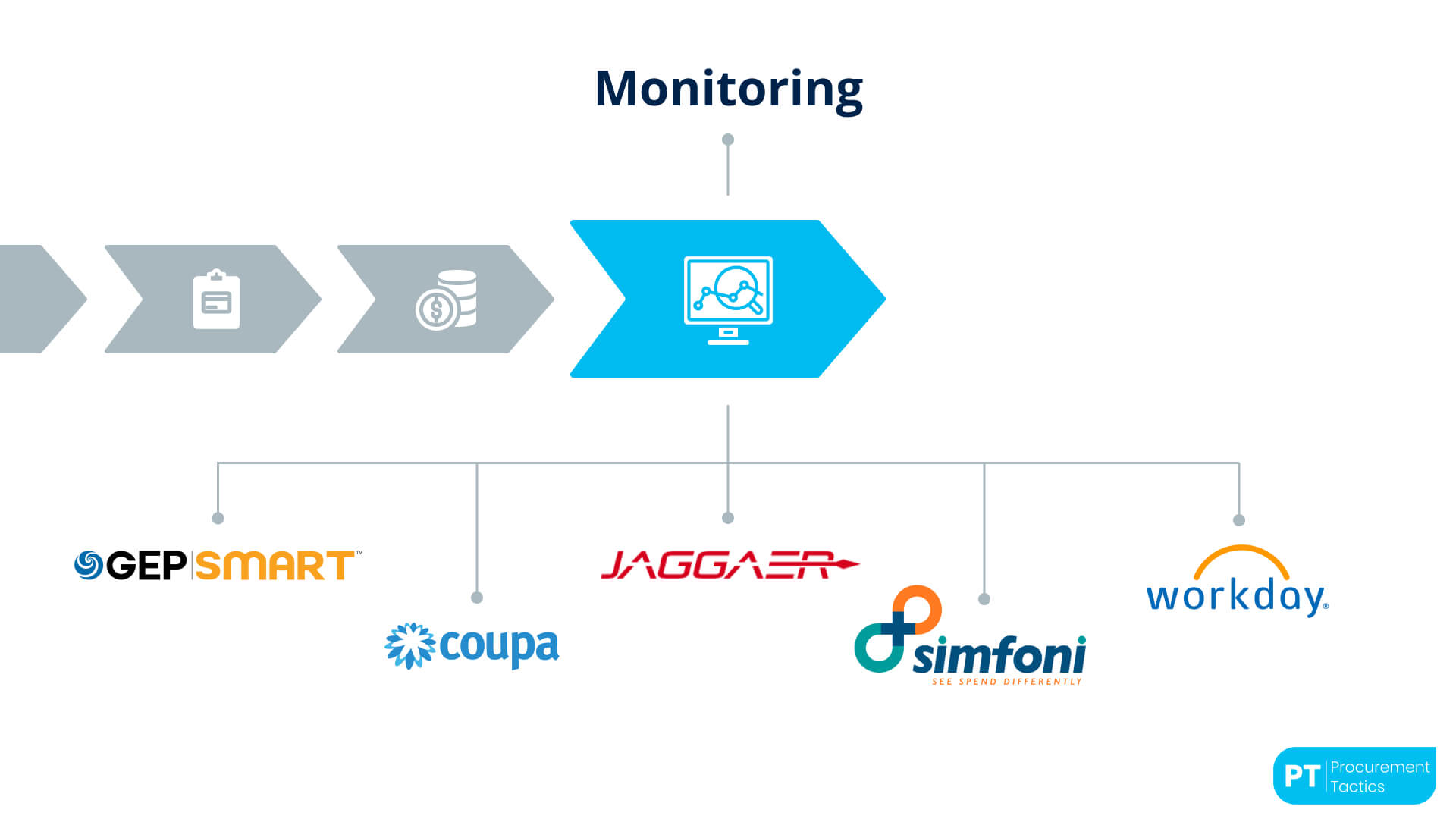
11. Monitoring
Monitoring keeps a real-time pulse on post-award performance and risk. Analytics compare contracted vs. actual spend to confirm savings; risk dashboards track financial, supply, and ESG exposure; SRM scorecards log on-time delivery, quality, and innovation KPIs; compliance checks ensure each country follows policy; and continuity alerts flag capacity, supplier, or geopolitical shocks.
The insights drive corrective action, feed future sourcing cycles, and protect business operations. Five software tools can automate this end-to-end oversight:
GEP Smart
GEP SMART centralizes contract spend, supplier scorecards, and risk dashboards on one cloud workspace, so teams can see savings achieved versus targets, track on-time delivery and quality KPIs, and monitor ESG or geopolitical exposure in real time. Automated alerts flag policy breaches, and configurable reports let finance, compliance, and category managers drill from global views to line-item detail.
GEP SMART’s AI assistant Ava predicts savings leakage, ranks suppliers by risk, and recommends corrective actions before performance slips.
Pricing:
GEP SMART is offered strictly on a quote-only basis.
Website Link: https://www.gep.com/software/gep-smart
Coupa
Coupa’s unified Business Spend Management suite cross-checks invoices, receipts, and POs against contract terms, then feeds live data into Community-AI benchmarks that compare cost, risk, and carbon metrics against thousands of peers. Sustainability, Risk & Compliance (SRC) Cloud consolidates sanctions, financial health, and ESG signals, while supplier scorecards and dashboards keep every region’s compliance status transparent.
Coupa’s Community.ai engine learns from a network of trillions in spend to flag anomalies and suggest savings or continuity safeguards automatically.
Pricing:
The Coupa Supplier Portal itself is free for “Registered” suppliers; optional upgrades include a Verified profile at US$ 549 per year and Premium Support packages starting from US$ 499 per year.
Website Link: https://supplier.coupa.com/pricing/
JAGGAER
JAGGER links sourcing, contracts, and SRM so that negotiated savings, supplier KPIs, and risk scores flow into a single cockpit. On-time delivery, quality incidents, and innovation metrics trigger built-in improvement plans, while integrated risk heat maps track financial, cyber, and geopolitical threats across the supply base and countries of operation.
JAGGER’s Autonomous Commerce AI grades supplier performance, predicts disruption, and proposes alternative sources when continuity is at risk.
Pricing:
JAGGAER’s Advanced Rates module (and the wider JAGGAER ONE suite) is priced strictly by custom quote; public benchmarks put entry-level JAGGAER ONE deals at ≈ US$ 45,000 per year, while the UK G-Cloud price sheet lists Source-to-Contract subscriptions starting at ≈ £ 25,000 annually and scaling upward with user count and spend bands.
Website Link: https://www.jaggaer.com/solutions/advanced-rates
Simfoni
Simfoni aggregates ERP, P2P, and contract data into dynamic spend and risk visualizations that spotlight price variance, compliance gaps, and supplier financial stress. Drill-down dashboards let teams prioritise corrective actions, and automated alerts push exception reports to stakeholders before issues hit the P&L.
Simfoni’s AI spend-intelligence engine classifies transactions instantly and detects savings erosion or high-risk suppliers ahead of time.
Pricing:
Simfoni Spend Analytics with a “Basic” tier that starts at US$ 1 per user per month, but the vendor prices full-scale implementations strictly by custom quote once data volume and user counts are scoped.
Website Link: https://www.capterra.com/p/206211/Spend-Analytics/
Workday
Workday Strategic Sourcing blends sourcing outcomes, contract milestones, and supplier scorecards with finance and HR data from the wider Workday suite, giving a full picture of savings realisation, policy adherence, and workforce or capacity risks. Real-time reports and audit trails satisfy regional compliance while mobile dashboards keep executives informed of continuity threats.
Workday leverages machine-learning insights in Prism Analytics to surface emerging spend, risk, and performance trends for proactive monitoring.
Pricing:
Workday HCM’s subscription at roughly US $34–42 per employee per month, translating to about US $150–300 K a year for companies under 500 employees and US $300–500 K for those with 500–2 500 staff; one-time implementation usually adds another 100–150 % of the annual software fee. Workday has dropped its historic US$ 250 K minimum, so final figures are still quote-only but typically fall within or above these ranges for larger enterprises.
Website Link: https://www.outsail.co/post/how-much-does-workday-cost
Conclusion
Procurement is no longer a back-office function focused solely on purchasing. It has evolved into a strategic pillar that drives business value. At the heart of this transformation is technology.
Modern procurement tools, powered by AI, automation, and real-time analytics, have redefined how teams operate, collaborate, and deliver impact. This shift has not only improved efficiency but also elevated procurement’s role in achieving cost savings, ensuring compliance, and supporting long-term growth.
As this technological evolution continues, organizations that fail to adapt will not just fall behind—they will lose relevance in an increasingly competitive and data-driven world.
Frequently asked questions
What are procurement tools?
Procurement tools are software platforms that help organizations manage and streamline different stages of the procurement process, such as sourcing, contracting, purchasing, and supplier management. Many modern tools also incorporate AI and analytics to support informed decisions and automate manual tasks.
Why are procurement tools important?
Procurement tools streamline complex workflows, increase visibility across the procurement cycle, reduce errors, ensure policy compliance, and help identify cost-saving opportunities.
Are procurement tools also suitable for small businesses?
Yes, tools like Pipefy and Spendwise offer affordable plans and user-friendly interfaces tailored to small and mid-sized businesses that want to digitize their procurement without a complex setup.
About the author
My name is Marijn Overvest, I’m the founder of Procurement Tactics. I have a deep passion for procurement, and I’ve upskilled over 200 procurement teams from all over the world. When I’m not working, I love running and cycling.





